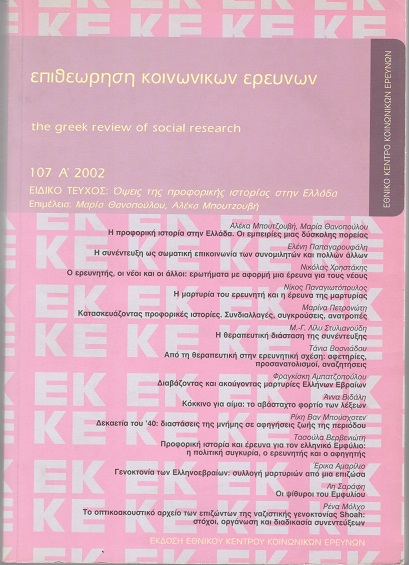Κόκκινο για αίμα: Το αβάσταχτο φορτίο των λέξεων
Abstract
Με αφορμή την ανάλυση της αφήγησης μίας γυναίκας του χωρίου Κ. γύρω από τα βίαια και τρομαχτικά γεγονότα της Αντίστασης και του Εμφύλιου, καταγράφω ορισμένες σκέψεις και προβληματισμούς σχετικά με τη μεθοδολογία της προφορικής ιστορίας. Υποστηρίζω ότι οι ψυχαναλυτικές έννοιες της «μνήμης» και του «τραύματος» μπορούν να βοηθήσουν στην κατασκευή μιας μεθοδολογίας της οποίας οι επιστημολογικές και οντολογικές παραδοχές δεν θα είναι αναγκαστικά ουσιοκρατικές. Η ανάλυση, δηλαδή, θα μπορούσε να προχωρήσει πέρα από τη φαινομενολογική ερμηνεία σε μια αποδόμηση του λόγου των γυναικών. Ως αποτέλεσμα η αφήγηση, η οποία παράγεται στον μεταξύ αφηγητή και ακροατή χώρο τόσο σε συνειδητό όσο και σε μη-συνειδητό επίπεδο, παύει να έχει την αξία αναπαράστασης ενός αυθεντικού γεγονότος.
Article Details
- How to Cite
-
Βιδάλη Ά. (2002). Κόκκινο για αίμα: Το αβάσταχτο φορτίο των λέξεων. The Greek Review of Social Research, 107, 121–132. https://doi.org/10.12681/grsr.9184
- Section
- Articles

This work is licensed under a Creative Commons Attribution-NonCommercial 4.0 International License.
Authors who publish with this journal agree to the following terms:
- Authors retain copyright and grant the journal right of first publication with the work simultaneously licensed under a Creative Commons Attribution Non-Commercial License that allows others to share the work with an acknowledgement of the work's authorship and initial publication in this journal.
- Authors are able to enter into separate, additional contractual arrangements for the non-exclusive distribution of the journal's published version of the work (e.g. post it to an institutional repository or publish it in a book), with an acknowledgement of its initial publication in this journal.
- Authors are permitted and encouraged to post their work online (preferably in institutional repositories or on their website) prior to and during the submission process, as it can lead to productive exchanges, as well as earlier and greater citation of published work (See The Effect of Open Access).



